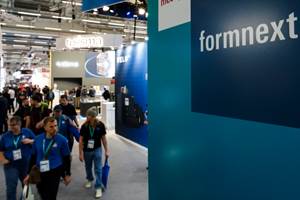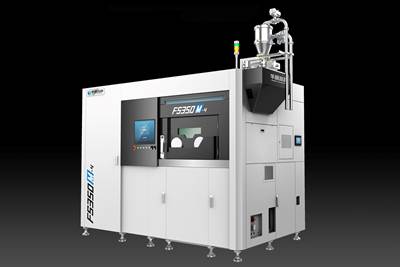3D Systems Develops Multimaterial, One-Piece Jetted Denture Solution
The combination of 3D Systems’ high-speed printing technology with unique materials for the NextDent Jet Denture Teeth and NextDent Jet Denture Base solution is designed to offer superior durability and aesthetics for a better patient experience.
Share
Read Next
3D Systems developed the NextDent Jet Denture Teeth to mimic tooth rigidity and aesthetics, while formulating the NextDent Jet Denture Base to absorb impact. Source: 3D Systems
3D Systems’ materials scientists developed the NextDent Jet Denture Teeth and NextDent Jet Denture Base solution for jetted, monolithic (one-piece) dentures that utilizes multiple materials to deliver a durable, long-wear, aesthetically beautiful prosthetic to the patient. The solution is enabled by the formulation of bespoke materials for both teeth and gums.
The company says these materials deliver the desired combination of aesthetics along with wear- and stain-resistance in the teeth, with exceptional break resistance (toughness and strength) in the gums. This combination results in a denture product that is better than current monolithic, jetted denture solutions.
When these materials are used as part of 3D Systems’ complete workflow solution comprising materials, jetted 3D printing technology, software and services, high-volume dental laboratories can more efficiently deliver dentures with improved performance and aesthetics, resulting in a superior patient experience.
3D Systems’ materials scientists developed the NextDent Jet Denture Teeth to mimic tooth rigidity and aesthetics, while formulating the NextDent Jet Denture Base to absorb impact. Using these materials as part of the company’s monolithic jetted denture solution, dental labs are able to produce dentures with exceptional performance, including high break resistance, which is an important customer need.
Additionally, the speed of 3D Systems’ jetting technology combined with monolithic denture printing accelerates total production rates in order to significantly reduce time to completion resulting in expedited delivery to the prosthodontist and patient.
In recent months, 3D Systems previewed this solution to select customers including Glidewell, the world’s largest producer of restorative dental devices.
“Glidewell prides itself on being on the forefront of technology, and continually bringing innovation to the dental community. Therefore, we need to collaborate with solution providers who share our vision for the power of transformative innovation,” says Stephenie Goddard, Glidewell CEO. “As a long-time 3D Systems customer, Glidewell continues to be impressed by the company’s leadership in digital dentistry. The capabilities presented by the new jetted denture solution are unmatched in the industry. The combination of 3D Systems’ high-speed printing technology and its unique materials deliver dentures with superior durability and aesthetics. I’m looking forward to our implementation of this solution later this year, and the benefits it will deliver not only for our business but for our customers and their patients.”
The company anticipates 510(k) clearance from the U.S. Food and Drug Administration (FDA) for its solution in the second half of 2024.
“With each innovation to our digital dentistry portfolio, 3D Systems has been able to help our customers transform the devices they deliver, and how clinicians deliver patient care,” says Chuck Stapleton, vice president and general manager, dental, 3D Systems. “I’m proud that we are once again delivering a truly unique offering to the market. We’ve combined innovation in materials and 3D printing, with software, postprocessing and applications expertise into our monolithic jetted denture solution, designed for high-volume production with unparalleled accuracy, repeatability and lower total cost of operation. I look forward to seeing this solution change the trajectory of denture production, not only over the coming months but in the years to follow.”
The adoption of 3D printing to produce prosthodontics continues to accelerate, driven by benefits to both manufacturers and patients alike. According to 360 Research Reports, the global 3D printed dentures market size was estimated to be more than $1 billion in 2021 and is forecast to reach more than $2 billion by 2028. With 3D Systems’ digital dentistry solutions — including its solution for the production of monolithic dentures — dental laboratories and clinics are able to produce dental devices at dramatically increased speed, while reducing material waste and capital equipment expenditures. Patients can also experience significant benefits, through reductions in the time it takes to receive their prosthodontics, as well as the number of required office visits.
Related Content
Horizon Expands Services With Subcontract Micro AM Production, Design Support
Horizon also offers a suite of proprietary coating processes that enable customers to successfully expand the functionality of parts which are typically produced in plastics on commercially available micro additive manufacturing platforms.
Read MoreWhat We Found at Formnext 2023
New metal processes, new possibilities for existing processes, the next step for copper and more. Here is a summary drawing on all our reporting from November’s event.
Read MoreMoldJet Technology Enables High-Throughput Metal, Ceramic Additive Manufacturing
Formnext 2023: Tritone Technologies’ additive manufacturing solutions enable industrial throughput of accurate parts with a range of metal and ceramic materials.
Read MoreCranial Implant 3D Printed From Hydroxyapatite Ceramic: The Cool Parts Show #76
Cranial implants are typically made from titanium or PEEK; in this episode of The Cool Parts Show, we look at how implants made from a bioceramic can improve osseointegration and healing.
Read MoreRead Next
Profilometry-Based Indentation Plastometry (PIP) as an Alternative to Standard Tensile Testing
UK-based Plastometrex offers a benchtop testing device utilizing PIP to quickly and easily analyze the yield strength, tensile strength and uniform elongation of samples and even printed parts. The solution is particularly useful for additive manufacturing.
Read MoreAlquist 3D Looks Toward a Carbon-Sequestering Future with 3D Printed Infrastructure
The Colorado startup aims to reduce the carbon footprint of new buildings, homes and city infrastructure with robotic 3D printing and a specialized geopolymer material.
Read MoreBike Manufacturer Uses Additive Manufacturing to Create Lighter, More Complex, Customized Parts
Titanium bike frame manufacturer Hanglun Technology mixes precision casting with 3D printing to create bikes that offer increased speed and reduced turbulence during long-distance rides, offering a smoother, faster and more efficient cycling experience.
Read More





















